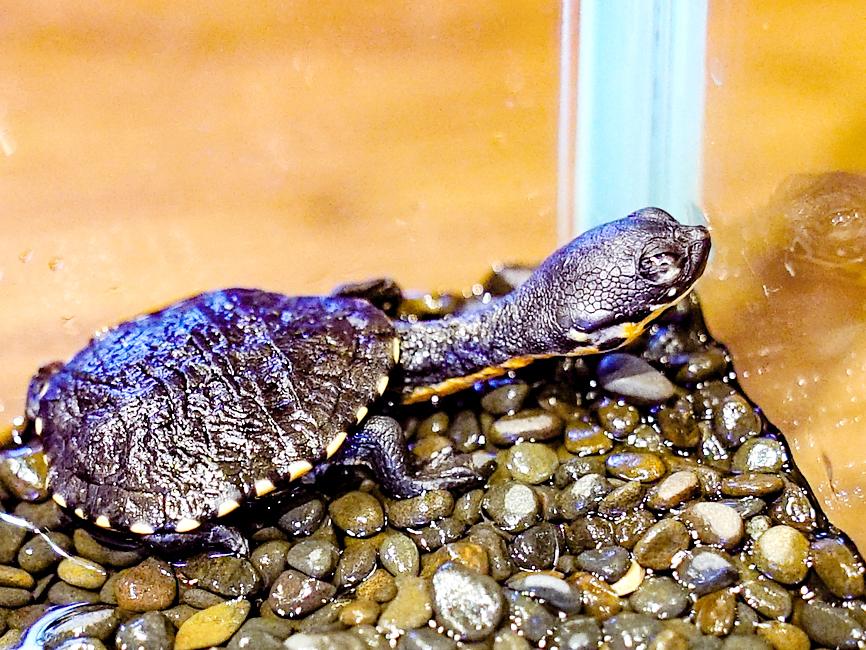Taipei Zoo has bred endangered Roti Island snake-necked turtles for the first time, it said on Wednesday.
The zoo said it bred two of the species, which is named for its long snake-like neck and the Indonesian island to which it is endemic.
“This is also a comparatively timid turtle. Even food frightens it when it first hatches,” the zoo said. “We finally got these two to eat by feeding them fruit flies and maggots.”

Photo courtesy of Taipei Zoo
The critically endangered Roti Island snake-necked turtle is native to Rote Island, and one subspecies can be found on nearby Timor, it said, adding that the species is mostly found in marshland, lakes and terraces.
They have yellow marks on their breastplates when they hatch that turn almost black within a few weeks, before gradually lightening into adulthood, it said.
Their shells grow to about 20cm in length when they mature, but their necks are too long to retract into their shells the way other turtles do, the zoo said, adding that they instead curl their necks around the sides of their shells while resting.
Due to hunting and the destruction of its natural habitat, the species is classified as critically endangered by the International Union for Conservation of Nature.
The zoo worked with the Turtle Island conservation center in Austria to import a Roti Island snake-necked turtle and attempt breeding, it said, adding that it produced its first fertilized eggs in April.
Eggs from the species typically have an incubation period of about 120 days, meaning that the eggs hatched this month, it said.
When hatched the turtles’ shells measured 2.5cm in length and weighed 3g, it added.
“These are aquatic turtles, so they spend most of their time in the water. When they are ready to lay eggs they come up on the shore, and then go back in the water afterward,” it said. “We have given this hatchling a shallow pool to move around in to be safe. We will gradually increase the depth of the water as it gets older.”
The Roti Island snake-necked turtle is a carnivorous turtle that normally feeds on small marine animals, it said.
“We racked our brains trying to think of what to feed them. We tried beef, chicken, worms and other things before we finally got them to eat fruit flies and maggots,” it said. “We will gradually diversify their diet as they grow.”

The Grand Hotel Taipei on Saturday confirmed that its information system had been illegally accessed and expressed its deepest apologies for the concern it has caused its customers, adding that the issue is being investigated by the Ministry of Justice Investigation Bureau. The hotel said that on Tuesday last week, it had discovered an external illegal intrusion into its information system. An initial digital forensic investigation confirmed that parts of the system had been accessed, it said, adding that the possibility that some customer data were stolen and leaked could not be ruled out. The actual scope and content of the affected data

‘LIKE-MINDED PARTNER’: Tako van Popta said it would be inappropriate to delay signing the deal with Taiwan because of China, adding he would promote the issue Canadian senators have stressed Taiwan’s importance for international trade and expressed enthusiasm for ensuring the Taiwan-Canada trade cooperation framework agreement is implemented this year. Representative to Canada Harry Tseng (曾厚仁) in an interview with the Central News Agency (CNA) said he was increasingly uneasy about Ottawa’s delays in signing the agreement, especially as Ottawa has warmed toward Beijing. There are “no negotiations left. Not only [is it] initialed, we have three versions of the text ready: English, French and Mandarin,” Tseng said. “That tells you how close we are to the final signature.” Tseng said that he hoped Canadian Prime Minister Mark Carney

POSITIVE DEVELOPMENT: Japan and the US are expected to hold in-depth discussions on Taiwan-related issues during the meeting next month, Japanese sources said The holding of a Japan-US leaders’ meeting ahead of US President Donald Trump’s visit to China is positive news for Taiwan, former Japan-Taiwan Exchange Association representative Hiroyasu Izumi said yesterday. After the Liberal Democratic Party’s landslide victory in Japan’s House of Representatives election, Japanese Prime Minister Sanae Takaichi is scheduled to visit the US next month, where she is to meet with Trump ahead of the US president’s planned visit to China from March 31 to April 2 for a meeting with Chinese President Xi Jinping (習近平). Japan and the US are expected to hold in-depth discussions on Taiwan-related issues during the

President William Lai (賴清德) yesterday bestowed one of Taiwan’s highest honors on Saint Vincent and the Grenadines (SVG) Ambassador Andrea Clare Bowman in recognition of her contributions to bilateral ties. “By conferring the Order of Brilliant Star with Grand Cordon on Ambassador Bowman today, I want to sincerely thank her, on behalf of the Taiwanese people, for her outstanding contribution to deepening diplomatic ties between Taiwan and SVG,” Lai said at a ceremony held at the Presidential Office in Taipei. He noted that Bowman became SVG’s first ambassador to Taiwan in 2019 and